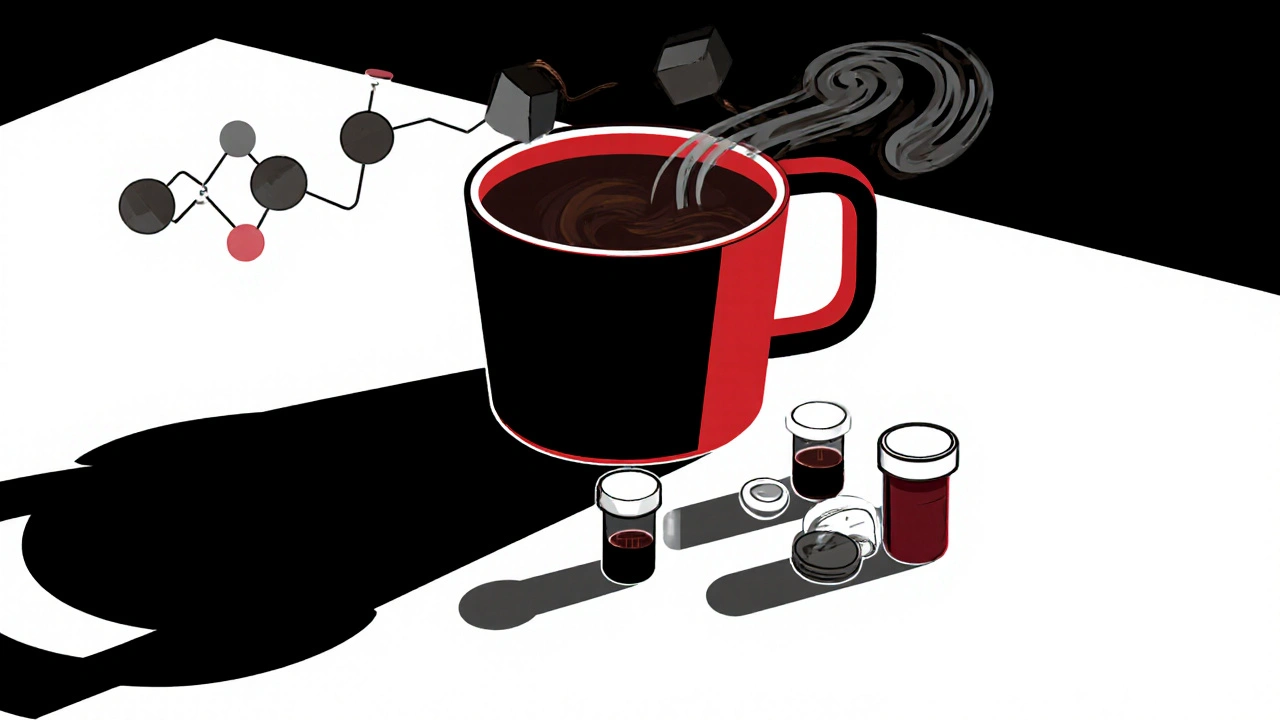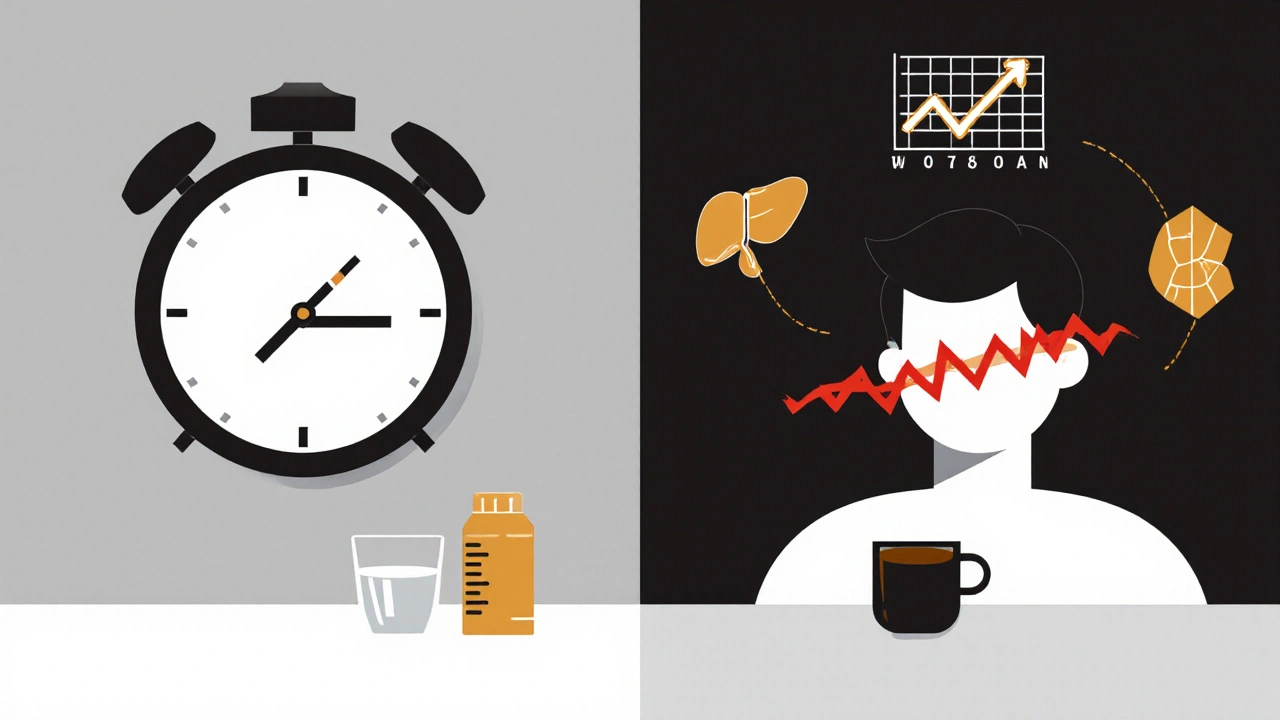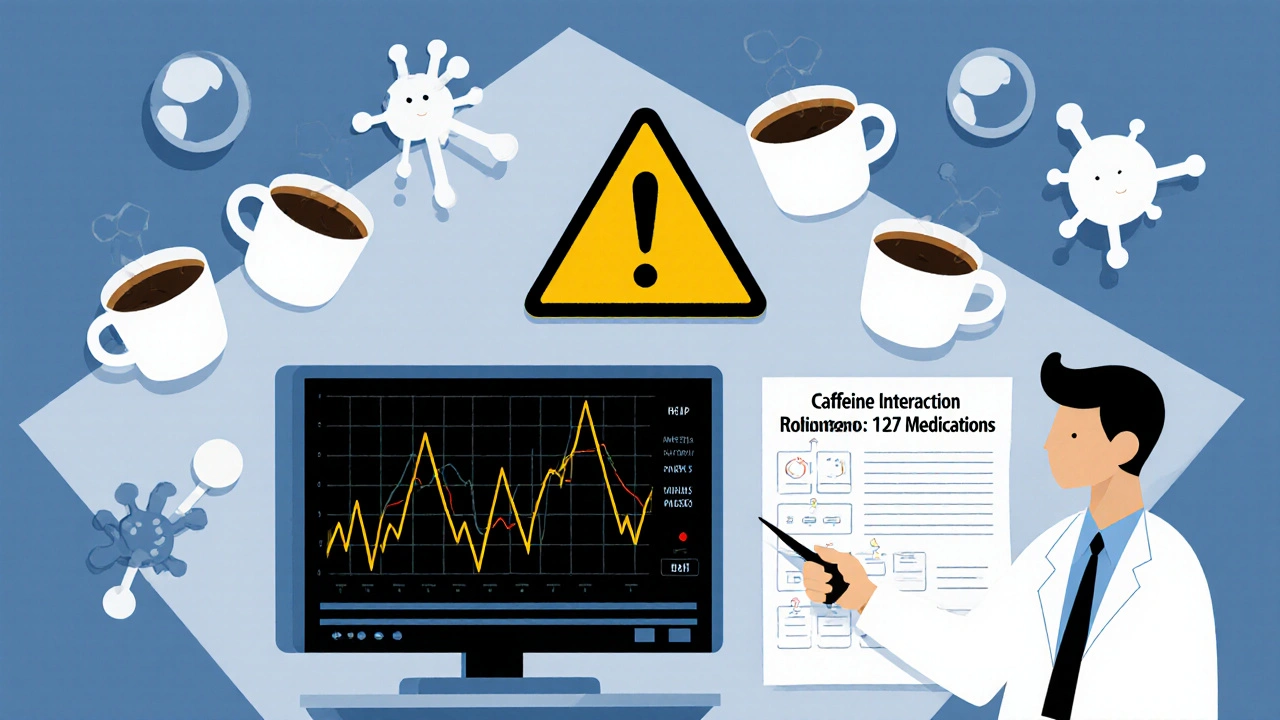Caffeine and Medications: How Your Coffee Could Be Making Your Pills Less Effective
 Oct, 28 2025
Oct, 28 2025
Every morning, millions of people reach for their coffee without thinking twice. But what if that cup of coffee is quietly sabotaging your medication? It’s not just a myth. Caffeine doesn’t just wake you up-it can change how your body handles prescription drugs, sometimes with serious consequences.
How Caffeine Interferes With Your Medications
Caffeine is more than just a stimulant. It’s a chemical that directly interacts with the enzymes in your liver responsible for breaking down medications. The main player here is CYP1A2, an enzyme that processes about 10-15% of all prescription drugs. Caffeine blocks this enzyme, which means your body can’t clear certain medications as quickly. The result? Higher drug levels in your blood, which can lead to side effects-or, in some cases, lower drug levels because caffeine changes how the drug is absorbed.
It’s not just about how much caffeine you drink. Timing matters too. Drinking coffee right before or right after taking a pill can make all the difference. Even decaf coffee contains 2-15 mg of caffeine per cup-enough to interfere with sensitive medications like thyroid hormone or certain antidepressants.
Warfarin and Blood Thinners: A Dangerous Mix
If you’re on warfarin (Coumadin), your doctor likely monitors your INR levels regularly. That’s because even small changes in your diet or habits can throw your blood clotting off balance. Caffeine is one of those hidden disruptors.
Studies show that consuming caffeine can increase INR levels by 15-25% within 24 hours. That means your blood takes longer to clot, raising your risk of dangerous bleeding. The American Heart Association recommends limiting caffeine to no more than 200 mg per day (about two cups of coffee) if you’re on warfarin-and, crucially, keeping your intake consistent. One day with three espressos, then switching to tea the next, can cause your INR to swing unpredictably.
Even newer anticoagulants like apixaban (Eliquis) are now being studied for caffeine interactions. Early data from a 2025 NIH study suggests high caffeine intake (>400 mg daily) may raise drug levels by 10-15%, increasing bleeding risk. If you’re on any blood thinner, don’t assume your doctor already knows about your coffee habit. Bring it up.
Thyroid Medication: Why You Need to Wait
Levothyroxine (Synthroid, Levoxyl) is one of the most commonly prescribed drugs in the U.S. But it’s also one of the most sensitive to food and drink. Coffee, even black and without sugar, can reduce its absorption by 25-57%.
A 2017 study with 98 patients showed that those who drank coffee within an hour of taking their thyroid pill had significantly higher TSH levels-meaning their body wasn’t getting enough hormone. One patient on Reddit shared: “I didn’t realize my coffee was making my Synthroid less effective until my TSH jumped from 1.8 to 4.5. Waiting 60 minutes after my pill made all the difference.”
The Endocrine Society’s official guideline is clear: take levothyroxine on an empty stomach, and wait at least 30-60 minutes before drinking coffee or eating breakfast. Many patients don’t know this. Doctors rarely mention it. But the evidence is solid.

Heart Medications: Caffeine Can Ruin Your Stress Test
Cardiac stress tests are used to check how well your heart handles physical strain. But caffeine can make these tests useless.
Drugs like adenosine and dipyridamole work by slowing your heart rate to mimic exercise. Caffeine blocks the same receptors these drugs target. If you’ve had even one cup of coffee in the last 24 hours, the test may show false results-meaning your doctor can’t tell if your heart is truly healthy.
The American College of Cardiology requires patients to avoid caffeine for a full 24 hours before the test. Yet, many patients still show up with coffee in their system. One patient on HealthTap wrote: “I had one cup of coffee before my test. The results were inconclusive. I had to reschedule-and wait another month.”
Even for daily heart medications like verapamil, caffeine can cause temporary spikes in blood pressure. Mayo Clinic notes that systolic pressure can rise 8-12 mmHg for 2-3 hours after caffeine intake. If you have high blood pressure or heart disease, that’s not worth the risk.
Psychiatric Drugs: Anxiety, Sleep, and Overdose Risk
Caffeine and antidepressants don’t mix well-and the effects vary wildly depending on the drug.
Fluvoxamine (Luvox) and escitalopram (Lexapro), both SSRIs, are metabolized by CYP1A2. When caffeine blocks this enzyme, these drugs build up in your system. Harvard Health reports a 33% drop in absorption when taken with coffee, but paradoxically, some patients experience higher blood levels due to enzyme inhibition, leading to increased side effects like jitteriness, insomnia, or even serotonin syndrome.
Tricyclic antidepressants like amitriptyline and imipramine can see plasma concentrations rise by 20-40% with regular caffeine use. That means you might feel more sedated than usual-or, worse, develop heart rhythm problems.
On PatientsLikeMe, users with ADHD report extreme jitteriness after taking Adderall with coffee. “I couldn’t sleep for 12 hours,” one wrote. “My heart felt like it was going to jump out of my chest.”
Dr. Robert H. Shmerling of Harvard Health puts it bluntly: “Drinking coffee-especially in large amounts-can affect how your body processes these drugs.” If you’re on psychiatric meds and suddenly feel more anxious, restless, or wired, check your caffeine intake before blaming your medication.
Seizure Medications and Diabetes: Hidden Risks
People taking anticonvulsants like carbamazepine, phenytoin, or valproate may find their seizures become more frequent when they drink coffee. A 2019 study in Epilepsy & Behavior found seizure frequency increased by 18-35% in patients who consumed caffeine daily. The exact mechanism isn’t fully understood, but caffeine’s stimulant effect on the brain likely lowers the seizure threshold.
For diabetics, the danger comes from over-the-counter cold medicines. Pseudoephedrine, common in decongestants, already raises blood sugar. Add caffeine, and you get a double hit. University Hospitals’ 2025 update found blood sugar spikes of 15-25 mg/dL and body temperature increases of 0.5-1.0°C in diabetic patients who combined the two. That’s not just uncomfortable-it can trigger diabetic ketoacidosis in vulnerable individuals.

What You Should Do
You don’t have to give up coffee. But you do need to be smart about it.
- Know your meds. If you’re on warfarin, thyroid hormone, antidepressants, seizure meds, or heart drugs, assume caffeine could interfere.
- Time it right. For thyroid meds, wait 60 minutes after taking your pill before drinking coffee. For most other drugs, avoid caffeine 1 hour before and 2 hours after taking your dose.
- Be consistent. If you drink coffee every day, keep it the same amount. If you skip it on weekends, your drug levels will swing.
- Read labels. Caffeine is in energy drinks, chocolate, tea, and even some pain relievers. Check the ingredients.
- Ask your pharmacist. Pharmacists are trained to spot these interactions. When you pick up a new prescription, ask: “Does this interact with caffeine?”
Decaf isn’t always safe. If you’re on a highly sensitive medication like levothyroxine or fluvoxamine, even decaf coffee can cause issues. Switch to herbal tea or water in the morning.
When to Seek Help
Some caffeine-medication interactions can be life-threatening. Call 911 or go to the ER if you experience:
- A heart rate over 120 beats per minute
- Systolic blood pressure above 180 mmHg
- Difficulty breathing
- Confusion, vision changes, or loss of coordination
- Twitching, rigid muscles, or shaking
- Worsening depression or suicidal thoughts
- Seizures or altered mental state
These aren’t rare. In adults over 50, caffeine-related drug interactions lead to emergency visits in 37% of cases. You don’t need to wait for symptoms to get worse. If you suspect your coffee is affecting your meds, talk to your doctor today.
The Bigger Picture
Over 150 million Americans take both caffeine and prescription drugs daily. That’s more than half the population. And yet, most people don’t realize these two things can clash.
Drug information systems now flag 127 medications for caffeine interactions-up from 89 in 2020. The FDA added 15 new warnings in 2024. Hospitals are now building caffeine screening into their electronic health records. This isn’t a minor issue. It’s a public health blind spot.
But the good news? It’s preventable. A 2024 University of Michigan study found that after proper counseling, 87% of patients followed the timing guidelines correctly. With a little awareness and a small change in routine, you can keep your meds working-and your coffee, too.
Can I still drink coffee if I’m on medication?
Yes, but timing matters. For most medications, avoid caffeine 1 hour before and 2 hours after taking your dose. For thyroid meds like levothyroxine, wait at least 60 minutes after your pill. If you’re on warfarin, limit caffeine to 200 mg per day (about two cups of coffee) and keep your intake consistent.
Does decaf coffee have caffeine?
Yes. Decaf coffee still contains 2-15 mg of caffeine per cup. That’s not enough to affect most people, but if you’re on sensitive medications like levothyroxine, fluvoxamine, or certain seizure drugs, even that small amount can interfere. If you’re unsure, switch to herbal tea in the morning.
How do I know if caffeine is affecting my medication?
Look for sudden changes: increased anxiety, trouble sleeping, heart palpitations, worsening symptoms, or lab results that don’t match your dosage. For example, if your TSH suddenly rises while on thyroid medication, or your INR spikes without diet changes, caffeine could be the culprit. Talk to your doctor and track your coffee intake for a week.
What medications are most affected by caffeine?
The top ones are: warfarin, levothyroxine, fluvoxamine, amitriptyline, carbamazepine, phenytoin, valproate, adenosine, dipyridamole, and pseudoephedrine-containing cold medicines. These are the most studied and carry the clearest risks. If you’re on any of these, treat caffeine like a drug interaction-not just a habit.
Can I just stop drinking coffee if I’m on medication?
You don’t need to quit entirely. Most people can keep drinking coffee if they follow timing rules. Stopping suddenly can cause withdrawal headaches and fatigue, which might make you feel worse than the interaction. The goal is smart management, not elimination. Talk to your doctor about what works for your specific meds.
Should I tell my doctor I drink coffee?
Absolutely. Many doctors assume patients know about these interactions, but they rarely ask. Bring up your coffee, tea, energy drinks, and even chocolate intake during every visit. It’s not just about caffeine-it’s about your overall health picture. Your doctor can’t help if they don’t know the full story.

Susan Karabin
October 29, 2025 AT 10:48So my doctor never mentioned this and I take Synthroid with my morning coffee like it's nothing
Turns out my TSH was climbing because of this
Now I wait an hour and my numbers are stable
Why is this not common knowledge??
Lorena Cabal Lopez
October 29, 2025 AT 23:07People really think caffeine is harmless. You drink coffee like it's water and wonder why your meds aren't working. Wake up.
Stuart Palley
October 30, 2025 AT 11:26I had a heart stress test last year and blew it because I had a latte at 7am and the test was at 10am
They had to reschedule me for a month later
My doctor acted like it was my fault but no one ever told me to stop coffee for 24 hours
That's on the system not me
Glenda Walsh
October 30, 2025 AT 19:59PLEASE PLEASE PLEASE tell your pharmacist about your coffee habit! I didn't and my blood pressure spiked to 190 after adding caffeine to my new blood pressure med! I almost ended up in the ER! Don't be like me! Ask! Ask! Ask! Your life depends on it!!!
Tanuja Santhanakrishnan
November 1, 2025 AT 19:39As a pharmacist in Mumbai, I see this every single day! People take levothyroxine with their masala chai and wonder why their TSH is sky-high
Even decaf chai has trace caffeine
I always tell them: 'Your medicine is like a quiet guest - don't let coffee crash the party' 😊
Switch to ginger or chamomile tea in the morning - it's a game-changer!
And yes, chocolate counts too! One dark chocolate bar = 20mg caffeine = possible interaction
Small changes, big results 💚
Raj Modi
November 3, 2025 AT 18:44It is of paramount importance to recognize that the cytochrome P450 enzyme system, particularly CYP1A2, serves as a critical metabolic pathway for a significant proportion of pharmacologically active compounds, including but not limited to anticoagulants, thyroid hormones, and psychotropic agents. The pharmacokinetic interference induced by caffeine, a methylxanthine derivative, results in competitive inhibition of hepatic metabolism, thereby altering plasma concentrations and potentially precipitating iatrogenic adverse events. Empirical evidence from peer-reviewed clinical trials, including those published by the National Institutes of Health and the Endocrine Society, unequivocally supports the implementation of temporally separated dosing protocols to mitigate these interactions. Furthermore, the persistence of suboptimal patient adherence to these guidelines underscores a systemic gap in pharmaceutical education and communication, necessitating proactive intervention by healthcare providers and pharmacists alike. It is not merely a matter of habit, but of pharmacological integrity.
Cecil Mays
November 4, 2025 AT 16:12Y'all need to stop treating coffee like it's just a drink 🤯
It's basically a drug. And if you're on meds? You're basically mixing two drugs.
I used to down 3 espressos with my Adderall - felt like a robot on fire.
Now I wait 2 hours after my pill. Life is calmer. Sleep is real. My heart isn't trying to escape my chest. 🙏☕
Sarah Schmidt
November 5, 2025 AT 03:33There's a deeper philosophical layer here - we treat caffeine as a benign ritual, a symbol of productivity, of adulting, of control over our chaotic lives. But when it interferes with the delicate biochemical architecture of our pharmaceutical interventions, we're not just being careless - we're betraying the very logic of modern medicine. We want to fix our bodies with science, yet we cling to cultural habits that undermine it. The coffee cup becomes a metaphor for our unwillingness to surrender to medical authority. We want the energy, the clarity, the ritual - but not the discipline. The irony is thick enough to spread on toast.
Billy Gambino
November 6, 2025 AT 01:16Given the documented CYP1A2 inhibition kinetics and the pharmacodynamic variability observed across therapeutic classes - particularly in anticoagulant and neuroactive agents - the assertion that caffeine represents a clinically significant modulator of drug bioavailability is not merely plausible, but empirically validated. The notion that decaf is 'safe' is a fallacy rooted in oversimplification. Even low-dose exposure in genetically susceptible phenotypes (e.g., slow metabolizers) can induce subtherapeutic or toxic plasma concentrations depending on temporal alignment. The current paradigm of patient education is reactive, not proactive. We need mandatory caffeine-interaction screening embedded in e-prescribing systems, not just a footnote in the leaflet. This isn't about coffee. It's about systemic medical negligence.